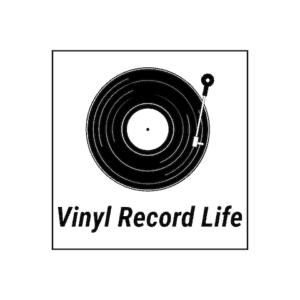Excessive heat damages vinyl records, causing them to warp and deform, so it’s normal to wonder whether records are flammable. It can be a concern for those who’ve recently started collecting records.
Vinyl records are not considered flammable and will not ignite on their own. If exposed to extreme heat a record will wilt, and if placed into a burning fire it will burn, but a vinyl record is not considered to be a fire hazard on its own.
Often, it’s the packaging of a record, such as the cardboard jacket and inner sleeve, which are much more flammable and which pose more of a fire threat. The way in which records are stored will also play a role in whether they are susceptible to catching fire.
Despite not being flammable, records are vulnerable to heat, and in this article we’ll look at how and why heat affect vinyl records and how you can protect your records.
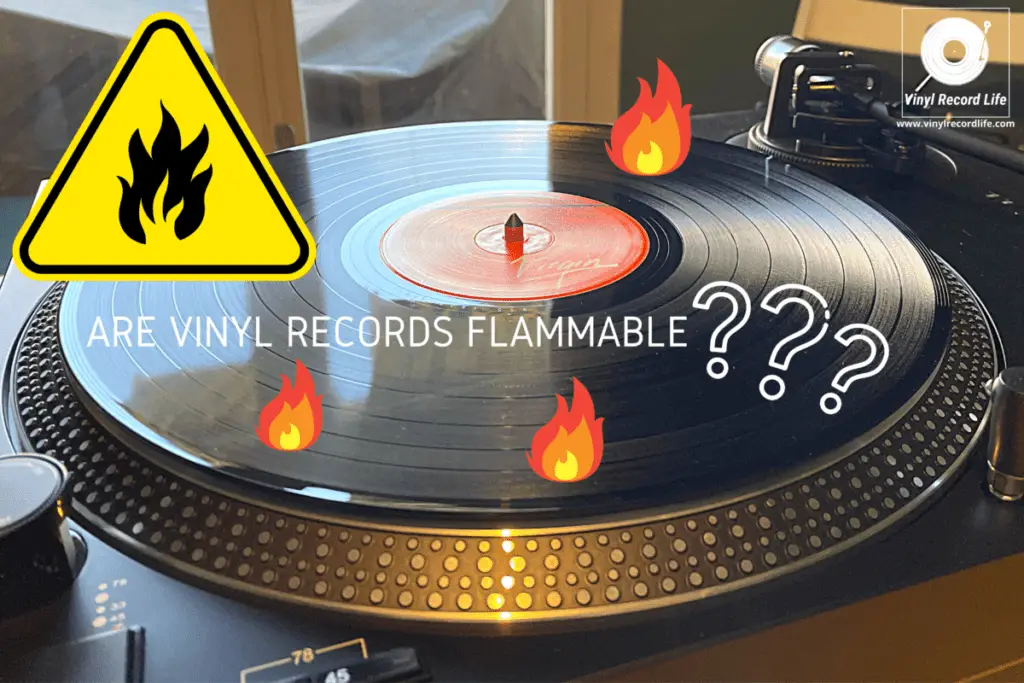
The Flammability of Vinyl Records
A vinyl record is made up of more than 95% Polyvinyl Chloride (PVC), which on its own is resistant to ignition, and has an auto-ignition temperature point of 850ºF (454ºC). Read more here about what vinyl records are made from.
Combining PVC with other materials will alter the flammability of whatever the final mix is, but in the resin mix that makes a vinyl record, the other materials – such as heat stabilizers – are there to help make the record more robust.
Of course, everything has its limit and as stated above a record will ignite at a critical temperature, but that is so high that it’s extremely unlikely to be reached in a normal atmosphere.
Vinyl Records and Exposure to Heat: The Effects
Far more likely to occur, and of therefore of greater concern, is damage to your records through exposure to moderate heat, the kind of which can occur frequently in normal living conditions.
Your records may not explode or go up in flames dramatically when exposed to a bit of excess temperature, but if your records are exposed to excessive heat it can be really detrimental to them, with the most notable outcome being warping.
Key Temperatures To Be Aware of for Vinyl Records
| Temperature | Result |
| 32ºF (0ºC) | Record will become fragile and more susceptible to damage/breaking |
| 65- 70ºF (18-21ºC) | Ideal storage temperature for vinyl records |
| 140ºF (60ºC) | Record will start to deform and warp |
| 212ºF (100ºC) | Record becomes completely malleable |
It’s widely accepted that an ambient temperature of between 65ºF (18ºC) and 70ºF (21ºC) is the temperature at which vinyl records can be stored safely, and won’t experience any undue stress.
We mentioned above that PVC’s auto-ignition temperature is around the 850ºF (454ºC) mark, but at a temperature of 140ºF, (60ºC) PVC will start to distort, so your record will deform and become warped.
If your record is exposed to temperatures exceeding 212°F (100°C), they’ll likely become so malleable that they can be rolled up like a tortilla.
To demonstrate what happens when a record’s exposed to these higher temperatures, we stuck an old, already-damaged and unplayable record in the oven at different temperatures. It’s advisable to not do this in a home oven, as vinyl records can melt and give off toxic fumes that are carcinogenic.
These were the results:
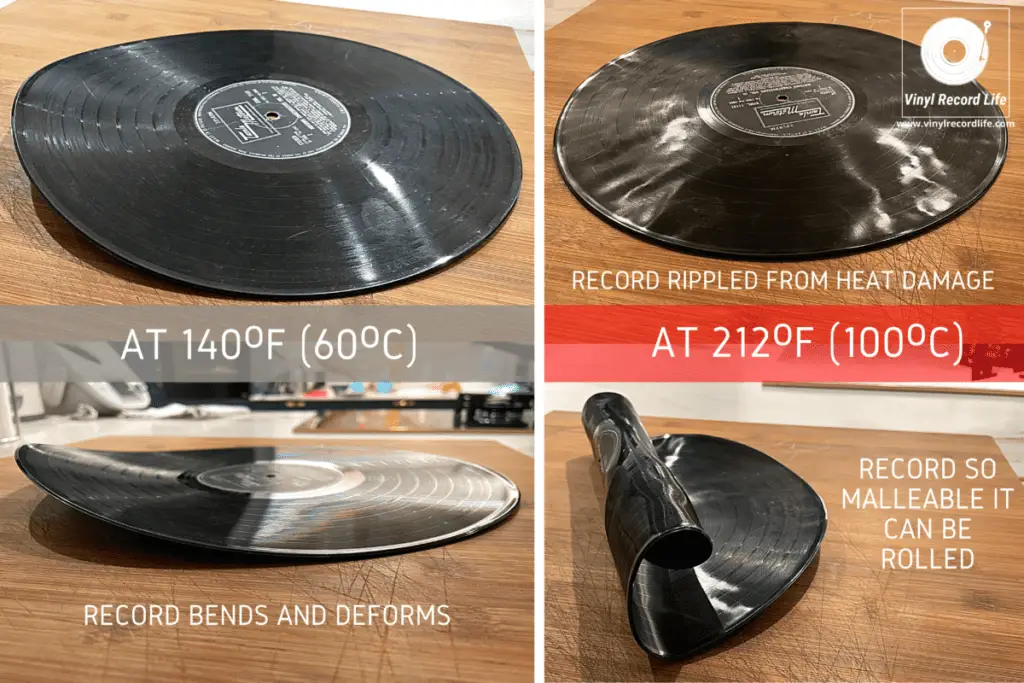
How To Protect Your Records From Heat Damage
The best way to stop your vinyl record collection from damage at the hands of excessive heat is to take care to store it correctly.
In our guide to storing vinyl records we outline the most important things to consider. Specifically for avoiding heat damage, the following points are essential:
- Keep records out of direct sunlight. The heat from the sun can reach damaging levels, especially if intensified by other ambient environmental factors, and the UV from the sun will also be detrimental. Keep your records well sheltered from any direct sun.
- Ensure a stable temperature for the room where you store your records. Heat fluctuations, especially towards the higher end of the thermometer, will not do your records any favors. Try to store them in a space where the ambient temperature will be as constant as possible, and avoid a room where you may need to switch the heating on and off at intervals.
- Make sure it’s the right temperature. Also, storing the records as close as possible to the optimum range stated earlier in the article is ideal.
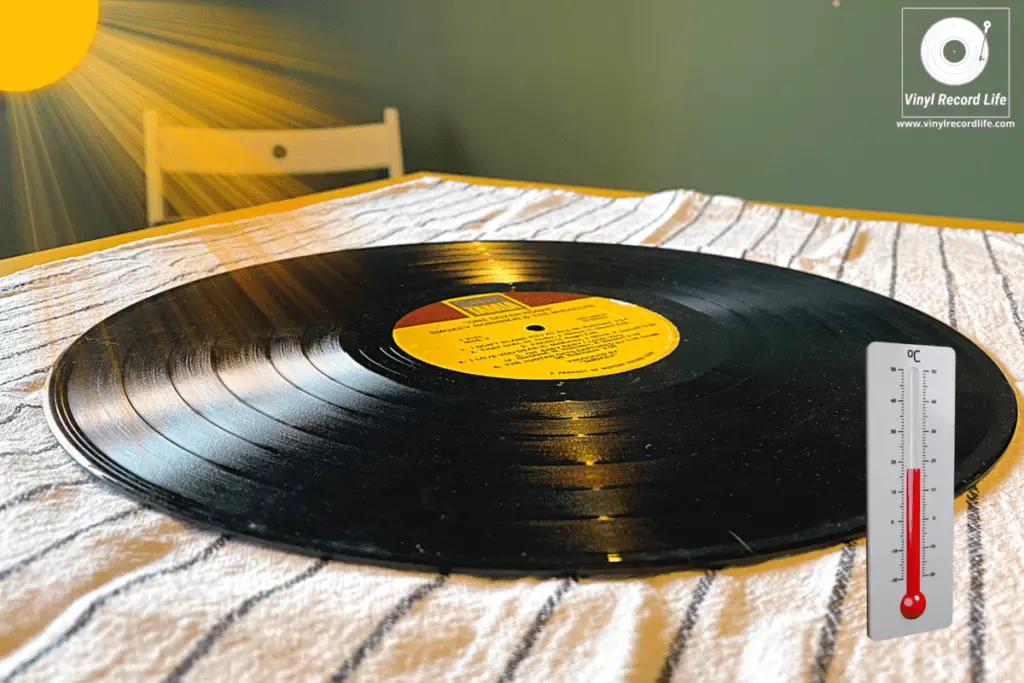
Does Humidity Affect Vinyl Records?
Along with heat, humidity is a key factor in protecting vinyl records from damage.
Ideally, records should be stored at around 40-50% humidity to keep them in good shape.
Mold has ruined many records, and damp conditions or humidity that starts to creep above 50% can cause mold to grow and fester in record jackets.
Mold can even begin to manifest in the record’s grooves if the situation gets out of hand, so it’s really important to ensure the right humidity in your record storage area.
One way to help keep dampness and moisture that leads to humidity under control is to place a very small dessicant pouch in the corner of a record jacket. These 1g packs are the right size for this.
These pouches have desiccant properties and help to keep moisture well managed. It’s an extreme measure, but one which can help protect any prized records in your collection against mold.
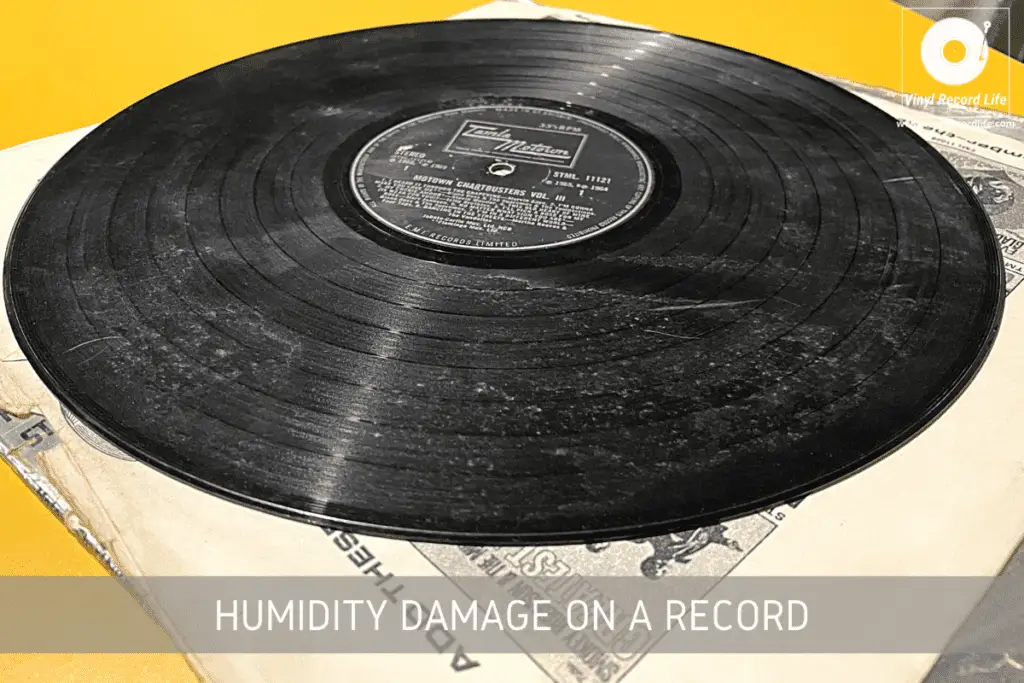
Going in the Other Direction: Can Records Be Stored in the Cold?
Cold is far less compromising for a vinyl record than heat is, but it’s the change in extreme temperatures that does need to be avoided at all costs.
If your records are stored in conditions that are fairly cool, that’s fine, as records can be reasonably resistant to temperatures as low as 40ºF (5ºC). They’ll be okay just under that temperature too, but when they get to freezing point 32ºF (0ºC) they can become fragile.
What is to be avoided at all costs is storing records in any kind of environment that will see them experience the extremities of cold and warmth, as this will create plenty of problems as outline above, as well as conditions that can create humidity and moisture.
